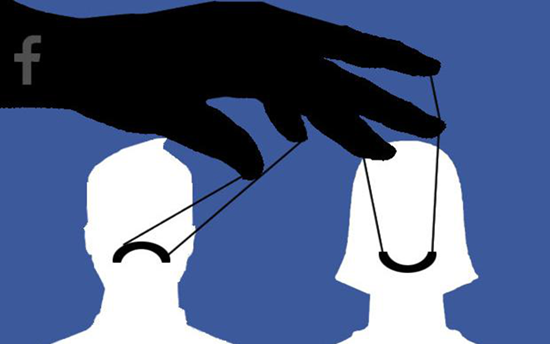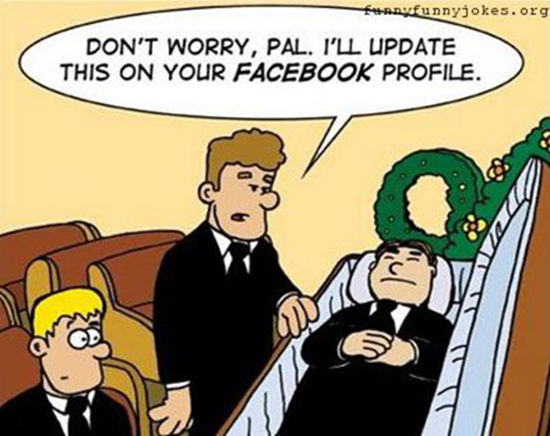
The public was outraged when it was revealed that Facebook had manipulated some of its users’ news feeds to see if Facebook can make us happy or sad. But previous studies by other researchers have already shown how Facebook twists our psyches.
10. Facebook Is Creating A Generation Of Spin Doctors
Especially for the 20-somethings who’ve grown up with Facebook, many of them create posts and profiles of themselves that are much more optimistic and upbeat than reality. They portray themselves as happier, thinner, more popular and more accomplished than they actually are. They know these images of themselves will be there for a long time. They deliberately spin their stories to look good.
According to Victoria Mapplebeck from Royal Holloway, University of London, they’re narcissists…self-centred individuals with an excessive need for admiration. They want other people to know every detail of their lives, including personal issues that normally would be private.
Mapplebeck wonders if these Facebook users really care what they read online about other people’s lives. She’s particularly concerned that Facebook wants to turn our emotions into clickable options. For now, there’s just a “like” button. But Facebook may add a “sympathy” button to deal with bad news like break-ups and illness.
Mapplebeck questions whether social media is changing the way we grow up - from how we spin our life stories to how we shortcut interactions with friends through online media rather than phoning or meeting in person. In a New York Times article, “The Facebook Resisters,” Ashleigh Elser, 24, confirms the interaction change. “I wasn’t calling my friends anymore,” she said. “I was just seeing their pictures and updates and felt like that was really connecting to them.”
9. Facebook Photos May Lead To Eating Disorders
A study published in the International Journal of Eating Disorders suggests that the more time young women spend on Facebook, the more likely they are to develop eating disorders. That’s because Facebook is so appearance-oriented that a young woman is more likely to dislike her body image.
The 960 college women who participated in the study often compared their photos to pictures of their friends. They untagged photos of themselves they disliked. And they were overly concerned with receiving “likes” and comments on their status updates.
When these Facebook users were compared to a control group, it took just 20 minutes of Facebook usage for a young woman to have heightened concern and anxiety over her weight and body shape. The researchers pointed out that these emotions increase the risk that these young women will develop eating disorders.
Another study found that the obsession with appearance is potentially more dangerous on social media than on TV and in magazines because young women know the people on social media. That makes the comparisons harder to deal with.
In a proud2bme.org article, “How Does Social Media Affect Your Body Image,” Kirby, 18, sums it up like this: “When I look at other people’s photo albums, the comparing is automatic. I end up feeling like crap.”
8. Facebook Affects The Closeness Of Our Friendships
The way you communicate with a friend on Facebook may affect the closeness of your relationship to that friend. According to research from Western Illinois University, if you only broadcast status updates, then your friend may feel like he or she is just one of the crowd held at arm’s length. Also, if your friend doesn’t post a lot of mass status updates to Facebook, then he or she won’t like it when you do.
But if you leave condolences or congratulations on your friend’s wall - in other words, take actions that are uniquely related to that person - then you’ll make that friend feel closer to you and more satisfied with your friendship. Your friends crave individual attention online to feel like you care.
This researcher found that Facebook itself doesn’t necessarily help or harm your friendships. It’s how you communicate with your friends on Facebook that affects the closeness of your relationships.
7. Many Facebook Users Who Publicly Support Charities Don’t Give
Many charities believe that connecting with donors online leads to more dedicated support. But researchers from the University of British Columbia found that people who publicly supported a charity online were actually less likely to pull out their wallets and donate later.
The researchers call these people “slacktivists.” Slacktivists take the easy way out by appearing to support a cause without really doing anything in terms of giving time or money to help.
This study showed that people who endorsed a cause by joining a Facebook group or by some other free public means were less likely to give a monetary gift later. But people who privately supported a cause - for example, by signing a private petition - were more likely to give to that charity later.
These British Columbia researchers believe the slacktivists just want to look good in public. But despite the slacktivism issue, another research group, SINTEF, found that most Facebook users in their more recent study believe that “liking” a charitable cause on Facebook can make a difference and encourage others to show support, too.
In 2013, UNICEF Sweden launched the “Likes Don’t Save Lives” campaign showing that likes won’t pay for food and clothes. Their goal was to raise money for vaccines and to make potential donors aware that likes aren’t important. Their video, “Like us on Facebook, and we will vaccinate zero children against polio,” went viral. UNICEF Sweden didn’t share their monetary results from the campaign.
6. Facebook Influences Risky Behaviour By Teenagers
Researchers at the University of Southern California surveyed over 1500 10th-grade students in Los Angeles County about their use of tobacco, alcohol and social media. Half of the students were boys; half were girls. Almost 30% had smoked and over 50% had consumed at least one alcoholic drink. About a third of these teens had at least one friend who smoked or drank.
The researchers found that the number of a teenager’s online friends didn’t really matter that much. It was merely the exposure to pictures of friends smoking or drinking that influenced the viewing teen’s behaviour. But surprisingly, the teenagers with close friends who abstained from drinking were even more likely to be influenced by greater exposure to online pictures of partying.
According to Columbia University’s National Centre on Addiction and Substance Abuse (CASA), when compared to teens who aren’t on social media, the teens who use social sites are 5 times more likely to smoke and 3 times more likely to drink.
As an example of social media influence, a wild Internet drinking game for teens called NekNomination spread quickly in 2014 on Facebook and Twitter. The kids took videos of themselves downing strong drinks in strange and sometimes dangerous circumstances like jumping in a river afterward. Jonny Byrne, 19, died that way in the Irish countryside.
With 80% of America’s teenagers using Facebook and other social networking sites to communicate with each other, this is a serious source of peer pressure. Researchers suggest that we teach young people about the dangers of posting these kinds of pictures online.
5. People Who Aren’t On Facebook Feel Meaningless
With Facebook usage so widespread as a way to keep in touch with friends and family, researchers from the University of Queensland believe it’s become a way to define our sense of social belonging.
These researchers performed two social experiments to see how lurking (which is passive participation on Facebook) and deliberate shunning (which occurs when the user receives no feedback on his or her posts) affect a participant’s sense of self-worth.
The first experiment on lurking divided a group into those who actively posted on Facebook and those who lurked by passively watching the status of their friends. After two days, the lurkers experienced a negative effect on their sense of self-worth.
The second experiment on shunning had all members of a group actively posting on Facebook. But half the group didn’t know that they were deliberately shunned - receiving no feedback on their posts - to see how they would react.
Both the lurkers from the first experiment and the shunned from the second experiment felt excluded, invisible and less worthy as individuals than active posters who were engaged with other users.
4. Unfriending Elicits A Rollercoaster Of Emotions
Researchers from the University of Colorado studied who was most likely to be unfriended on Facebook and how a person would respond emotionally to being unfriended.
They found that the top five types of people most likely to be unfriended were high school friends, other, friends of a friend, work friends and common interest friends. Co-workers get unfriended more often for the things they do in the real world rather than their online postings. The most unfriended, high school friends, are more likely to offend us because we grow apart in terms of political or religious beliefs.
People’s reactions to being unfriended ranged from surprise and anxiety to amusement and sadness. You’re more likely to be sad and anxious if you felt close to the other person at the time of unfriending and if you monitored that person’s postings closely. In a Mashable, “Why Being Unfriended on Facebook Hurts,” Ben, 13, says that it makes him sad to be unfriended because Facebook is a part of his identity.
But here’s the surprise finding: unfriending is more likely to occur to friends who were once close than to mere acquaintances. The researchers point out that it’s easy to maintain a large network of friends on Facebook. So if someone deliberately unfriends you, it’s especially hurtful.
3. Facebook Friends Can Make You Feel Awkward And Ashamed
Almost every participant in a study by Northwestern University had experienced “face threats” in the six months prior to the study. These threats weren’t threats of violence or anything like that; they were threats to self-esteem and privacy. For example, if a friend posts information about you that you don’t want everyone to know, that’s a threat. Or maybe someone posts a picture of you that they think is funny, but you find to be embarrassing. Again, that’s a threat.
The researchers wanted to see how strongly people reacted to face threats. As it turns out, Facebook users who were concerned about their online reputations or had a wider circle of friends accessing their page (e.g., friends, family and co-workers) were more likely to be embarrassed or anxious about what other people post about them on Facebook.
Ultimately, the researchers concluded that people should consider a friend’s Facebook audience before posting any comments or content to their page.
2. Moods Are Contagious On Facebook
Before Facebook’s own experiment, a study from the University of California at San Diego looked at data on over 100 million Facebook users to see if moods are contagious on Facebook.
The researchers realized that rainy weather increases the number of negative posts and decreases the number of positive posts by Facebook users. So by analyzing the changes in those users’ emotional expression according to the weather, the researchers concluded that moods do spread online, especially positive expressions of emotions.
Another study published more recently by social scientists at Cornell University, the University of California at San Francisco and Facebook itself, manipulated the emotional tone of news feeds for almost 700,000 Facebook users to measure “emotional contagion.”
These researchers famously found that Facebook users react more positively for days to positive emotion updates from friends. On the flip side, users who had fewer emotional posts in their news feeds withdrew emotionally for a few days. These findings suggest that the emotions communicated on social media can become contagious and influence other people’s moods.
1. Facebook Has Changed The Face Of Death
Facebook has even changed the way we mourn. While it may be comforting to have digital reminders of your loved ones, there can also be negative consequences.
Until social media became popular, public mourning was declining in western cultures as social and religious traditions changed. But family and friends may not be able to control the privacy of their mourning any longer. While the researchers at Lancaster University didn’t have any answers, they did spotlight some of the challenges of death in the age of social media.
For example, how do you take custody of the online remnants of someone’s life - such as emails, videos and digital photos - that can’t be divided up, stored or sold like old jewellery? If someone’s online remains are searchable, can videos and status updates be reinterpreted after death in a way that can haunt the living?
This can be especially unsettling if someone commits suicide or is murdered. Depending on what happens, every online communication of your loved one may become national or worldwide news, dissected by “experts” who never knew that person.
For the family of Skylar Neese in Morgantown, West Virginia, Facebook photos and tweets posted by Skylar and her two “best friends” had to be evaluated and re-evaluated when those best friends were found to have stabbed her to death in 2012.
Then there’s the case of Elliot Rodger, 22, who went on a shooting spree in Isla Vista, California, in 2014 to take revenge on women for rejecting him. His Facebook post that he was a virgin was met with derision. Rodger portrayed himself as a frustrated loner on Facebook and a blog and in his YouTube videos. Echoing a question that many had, ABC News’ David Muir asked, “Were there warning signs the parents should have seen?” His father says they knew Elliot was troubled, but they never expected homicide to be the result. Upset parents of Rodger’s victims also used Facebook to mourn the loss of their children.










No comments:
Post a Comment
Please adhere to proper blog etiquette when posting your comments. This blog owner will exercise his absolution discretion in allowing or rejecting any comments that are deemed seditious, defamatory, libelous, racist, vulgar, insulting, and other remarks that exhibit similar characteristics. If you insist on using anonymous comments, please write your name or other IDs at the end of your message.